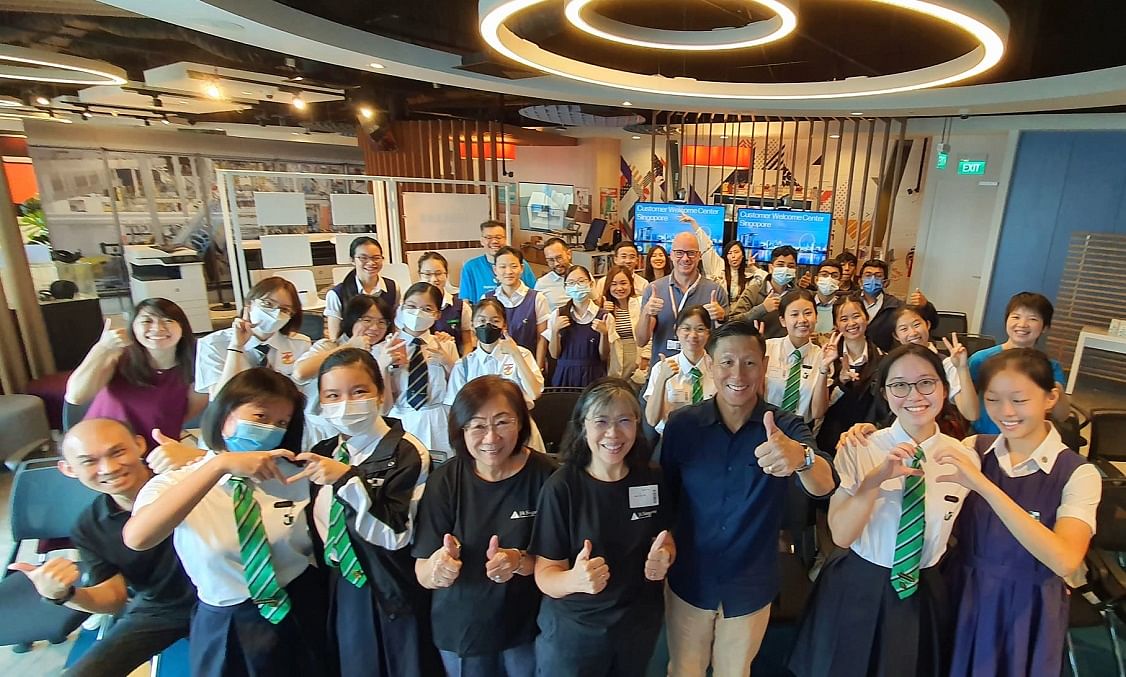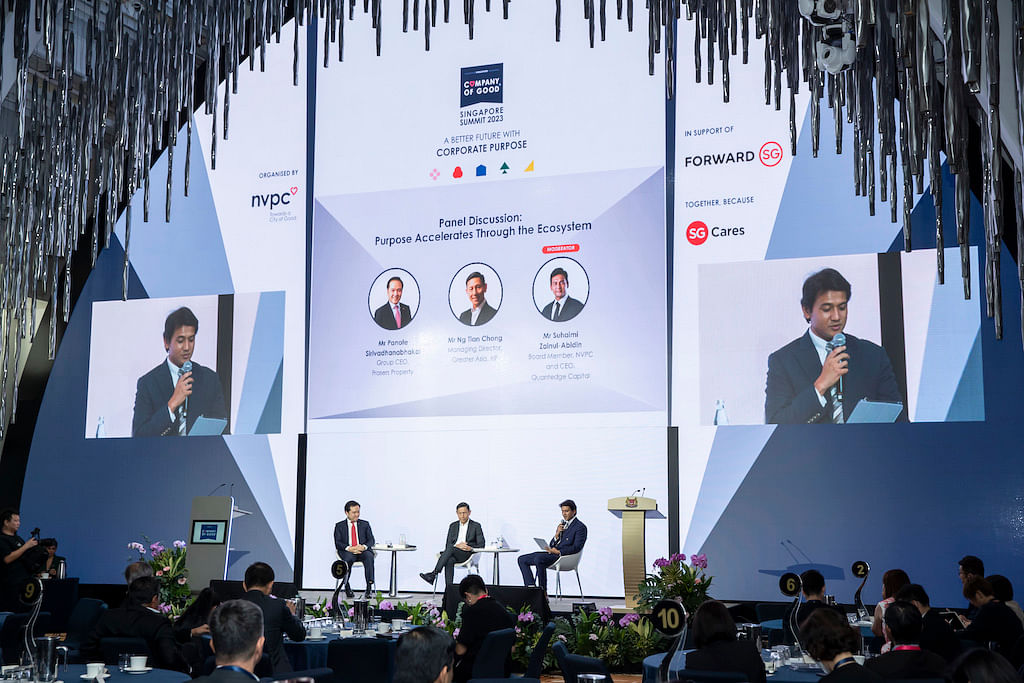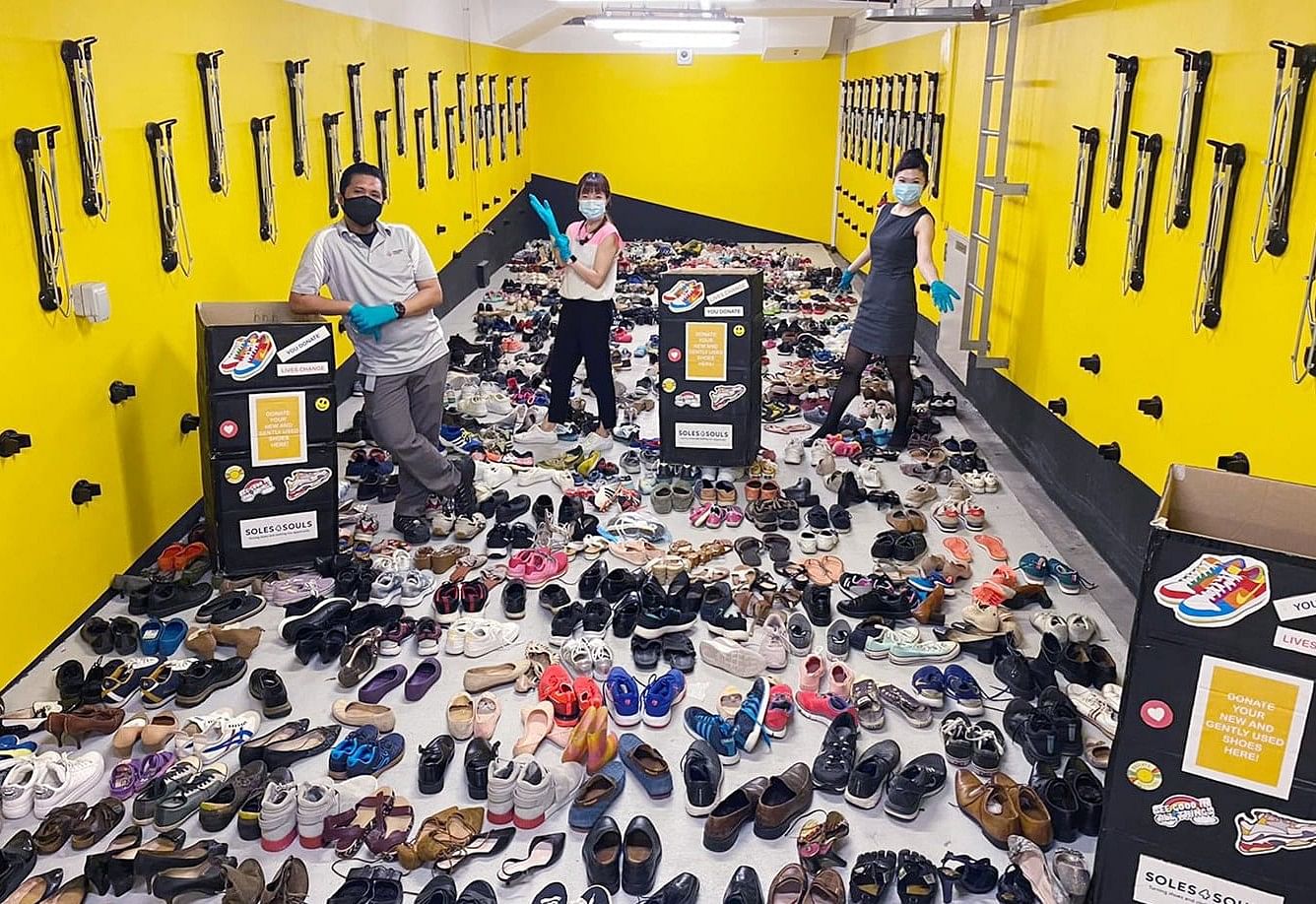
From circular economy to food distribution: These purpose-driven businesses are creating a multiplier effect
This article was originally published on The Straits Times.
Printing is still a big part of our lives despite the paperless revolution. When printers run out of ink, the plastic ink cartridges are thrown away, ending up in landfills where they take over 1,000 years to break down. In the US alone, about 375 million ink cartridges are disposed of every year.
Furthermore, toxic materials in printer ink could seep into the ground or release harmful chemicals into the air after disposal, impacting our environment even further. The plastics used in printing equipment may break down into microplastics, which may find their way into oceans and rivers, polluting these bodies of water and endangering aquatic wildlife.
Reducing the impact of printing on the environment is one of HP’s missions to achieve its goal of being the world’s most sustainable technology company. HP aims to become a fully circular company powered by service models and circular design in its products.
This purpose led HP to introduce the HP Planet Partners Program in 1991, which allows customers to return and recycle print supplies and hardware with ease. By doing so, it keeps plastics out of oceans and landfills, thereby attaining a closed loop recycling process.
 HP recognises the need for continued dialogue and cooperation to solve the challenges of sustainability. One of its initiatives is the Young Technopreneur Challenge, a competition that aims to equip secondary school students with essential life skills to develop sustainable solutions in relation to UN 17 Sustainable Development Goals. PHOTO: HP SINGAPORE
HP recognises the need for continued dialogue and cooperation to solve the challenges of sustainability. One of its initiatives is the Young Technopreneur Challenge, a competition that aims to equip secondary school students with essential life skills to develop sustainable solutions in relation to UN 17 Sustainable Development Goals. PHOTO: HP SINGAPORE
Within Singapore, general e-waste such as computers, laptops, monitors, on top of printing equipment, are collected through HP’s Planet Partners Program. This lets HP’s commercial customers recycle their e-waste from all electronic brands, with HP-approved recycling partners that meet both HP’s and International Recycling Standards. Through its e-waste recycling and HP Planet Partners Program, HP is able to create lasting positive change for the planet and the communities it lives and works in.
HP is part of the National Volunteer and Philanthropy Centre’s (NVPC) Company of Good network of over 2,000 companies in Singapore, through which like-minded companies learn, engage and collaborate on their journey towards adopting corporate purpose.
 Frasers Property’s Group CEO Panote Sirivadhanabhakdi (left) and HP’s managing director, Greater Asia, Ng Tian Chong (middle) were panellists at the Company of Good Singapore Summit in January where they discussed how companies can do good through the business ecosystem. PHOTO: NATIONAL VOLUNTEER & PHILANTHROPY CENTRE
Frasers Property’s Group CEO Panote Sirivadhanabhakdi (left) and HP’s managing director, Greater Asia, Ng Tian Chong (middle) were panellists at the Company of Good Singapore Summit in January where they discussed how companies can do good through the business ecosystem. PHOTO: NATIONAL VOLUNTEER & PHILANTHROPY CENTRE
To initiate more thoughtful discussions about how businesses can drive positive change, NVPC held the inaugural Company of Good Summit in January. It gathered leaders in business, government and society to discuss how corporate purpose can lead to a better future.
Mr Ng Tian Chong, HP’s managing director, Greater Asia, was one of the panellists at the summit. He views the event as a great opportunity to exchange insights with others on how to better execute one’s corporate purpose.
“At HP, we’ve long recognised the need for continued dialogue and cooperation to solve the challenges of sustainability,” says Mr Ng. “We can learn and apply fresh ideas to tackle the issues of climate change, human rights and digital equity together to create a better future for Singapore.”
A multi-faceted approach to doing good
Mr Panote Sirivadhanabhakdi, Group CEO of Frasers Property was part of the panel with Mr Ng. He shared how real estate developers can do their part in accelerating change within the environment and the community.
“Real estate is a people business. It has a pivotal role in society in shaping the experiences of people and communities. Our purpose bears a lot of meaning and relevance as we focus on creating lasting shared impact for our stakeholders – our people, customers, business partners, shareholders and the communities in which we operate,” he says.
As a global property company with more than 1,000 properties in over 70 cities, Frasers Property is in a strong position to commit and deliver on some ambitious sustainability and community goals.

To promote positive change in the community and the environment, Frasers Property organises various programmes for the public to participate in. One of them is the Soles4Souls programme where shoppers at their malls could donate their gently worn shoes and help victims of disaster and poverty get back on their feet. PHOTO: FRASERS PROPERTY
For instance, it is the first Singapore Exchange-listed real estate company to fully commit to net-zero carbon by 2050.
“We are conscious that the built environment accounts for nearly 40 per cent of global carbon emissions,” says Ms Soon Su Lin, CEO of Frasers Property Singapore. “As a leading multinational real estate business, we believe that across the real estate lifecycle, we have to lead and act as a responsible investor, developer and operator.”
To accelerate positive change within its supply chain, Frasers Property initiated the Group Responsible Sourcing Policy, which includes asking suppliers, vendors and contractors to disclose sustainability-related data as part of a mandatory pre-qualification process.
To help curb carbon emissions generated by transportation, Frasers Property aims to deploy 44 new EV charging points throughout its malls and commercial properties.
To tackle food waste as well as to help needy families, Frasers Property has been partnering The Food Bank Singapore since 2019. The partnership involves placing Food Bank donation boxes throughout its commercial and retail properties to collect donated non-perishable food items.
As frequented community nodes, these properties serve as convenient locations for the public to donate food, which is redistributed to needy households through organisations such as family service centres, soup kitchens and other volunteer groups.
Embedding corporate purpose into its business practices has enabled Frasers Property to strengthen not only its business – it also enables stakeholders and immediate communities to do good.
Mr Panote adds: “Businesses can be a force for good and a clear corporate purpose demonstrates businesses’ intent to contribute positively to the economy and wider community.”
How investment stewardship supports organisations’ long-term growth
Another Company of Good that integrates corporate purpose in its business practices is investment firm BlackRock.
It is leveraging its position as one of the world’s leading investment firms to push for ethical business practices. Through investment stewardship, it encourages its stakeholders and partners to improve in areas such as climate support, labour practices, board quality, financial strength, among others.
“We believe strong leadership and responsiveness will be key to delivering value for shareholders in the face of near-term business challenges and longer-term shifts in society,” adds Ms Deborah Ho, BlackRock’s country head Singapore and head of South-east Asia.
It recognises that the money it manages belongs to their clients who are focused on long-term financial goals, such as retirement, buying a first home or funding their children’s education.
“This is why everything we do is based on our role in helping reach their financial objectives – and that means navigating changing business and macro environments to steward clients’ assets,” says Ms Ho.
One of BlackRock’s approaches to establish this is by investing in companies based on principles of good corporate governance and oversight to ensure they take into account the interests of long-term investors.
Dedicated specialists in its investment stewardship team conduct multi-year engagements to understand companies’ purpose, strategy and actions, and how those drive performance and create sustainable long-term value over time. BlackRock also steps in when it uncovers companies running a risk that goes against corporate purpose.
For instance, when one of the companies, a major sustainable agricultural producer in South-east Asia, was investigated for allegations of forced labour, BlackRock reached out to the company’s management to discuss the problems and intervened to determine what actions could be taken to improve the situation. It was a boon for both the company and investors as such issues could be detrimental to credibility and hurt the company’s financial performance.
“Understanding a company’s purpose and advocating for the long-term interests of our clients through investment stewardship is how we encourage sound corporate governance and resilient business models,” says Ms Ho.
At HP, having a firm understanding of its corporate purpose has enabled leaders and staff to guide its business strategy to continually innovate. “From our earliest days as a company, it has been a place where innovation drives extraordinary contributions to humanity. Companies like ours have a critical role to play in helping solve today’s most pressing problems,” says Mr Ng.
But the company recognises that it cannot do it alone – for positive change to be long-term, it depends on everyone to do its part.
“Sustainability and social programs are a collaborative effort, requiring a culture shift. We can only reach our goals by involving our partners, community, and customers to fully integrate sustainable impact and purpose throughout every aspect of our business and ecosystem,” adds Mr Ng.
BlackRock, Frasers Property, HP


